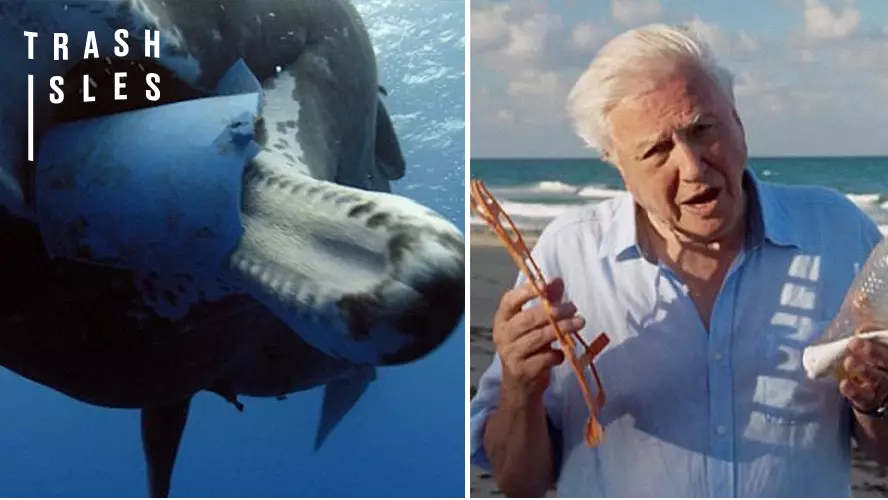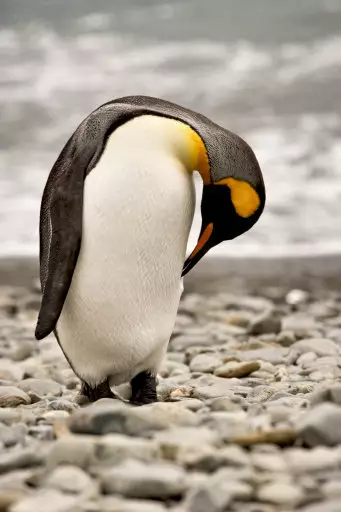
Sir David Attenborough is one of the most revered experts of the natural world so when he gives a warning about environmental damage, people are bound to take it seriously.
And now he has issued a stark warning about the future of the world's oceans, saying that our oceans and seas are under their biggest threat in human history, as has been highlighted in LADbible's Trash Isles campaign.
The warning comes in the final episode of Blue Planet II - set to air this Sunday at 8pm on BBC1 in the UK - which will explore the damage caused to oceans by man-made factors like climate change, plastic pollution, over-fishing and noise.
Advert

Sir David Attenborough. Credit: PA
"For years we thought the oceans were so vast and the inhabitants so infinitely numerous that nothing we could do could have an effect upon them. But now we know that was wrong," Attenborough will say in the episode.
"It is now clear our actions are having a significant impact on the world's oceans. [They] are under threat now as never before in human history. Many people believe the oceans have reached a crisis point.
Advert
"Surely we have a responsibility to care for our blue planet," Attenborough adds. "The future of humanity, and indeed all life on Earth, now depends on us."
Credit: BBC / Blue Planet II
Apparently, BBC top dogs were concerned about the series becoming too political and ordered a fact-check, but all the facts pulled together by the Blue Planet II team were true.
The producer of Blue Planet II, Mark Brownlow, stressed that the series is not setting out to campaign, but the harm being caused to oceans simply cannot be ignored any longer.
Advert
"We just couldn't ignore it - it wouldn't be a truthful portrayal of the world's oceans," Brownlow said. "We are not out there to campaign. We are just showing it as it is and it is quite shocking."

A king penguin on South Georgia Island, Antartica. Credit: PA
Advert
Brownlow revealed that much of the footage filmed by the crew, such as footage of albatross chicks killed by plastic they mistake for food, were too upsetting to be shown in the programme.
The Blue Planet II team found plastic wherever they went, even in far-flung locations like South Georgia island off the coast of Antarctica, which is a vital breeding ground for albatrosses
There, they found many birds killed by plastic which their parents feed them by accident, including one bird whose stomach was punctured by a plastic toothpick.
Along with plastic pollution, crews also filmed on the Great Barrier Reef in 2016 where they witnessed the worst bleaching event in the reef's history, caused by rising ocean temperatures due to climate change.
Advert
Despite corals being vital nurseries for ocean life, they are also damaged by seawater turned acidic by carbon dioxide released by humans burning fossil fuels like coal, oil and natural gas.
Prof. Chris Langdon of the University of Miami believes it is "beyond question" that the problem is man-made. "The shells and the reefs really, truly are dissolving," he said. "The reefs could be gone by the end of the century."

The Great Barrier Reef. Credit: PA
The final episode of Blue Planet II will also reveal that over-fishing and noise from shipping, tourism and fossil fuel exploration is hurting sealife. One example to be shown on the programme will involve noise from motorboats distracting clownfishes from escaping attacks by predators.
While all of this sounds bleak, the show will also highlight the good humans can do for the oceans, such as by imposing fishing bans or restrictions to revive sperm whales off the coast of Sri Lanka and herring stocks in Norway.
The episode will also come off the back of the news that this week the world's nations will sign a UN resolution to stop plastic waste from entering the oceans, a small but significant step towards solving the problem.
As Blue Planet II shows, our oceans are stunningly beautiful and essential for the survival of much life on this planet. Now we have to follow Sir David Attenborough's warning and save them.
LADbible has claimed the world's first country made entirely of trash to highlight the issue of plastic pollution in our oceans.
Get involved and ensure the world's first country made of trash is its last.
Become a citizen of the Trash Isles here
Donate to our charity partner, Plastic Oceans Foundation here
Topics: Entertainment, TV and Film, climate change, plastic pollution, david attenborough, Sir David Attenborough, Animals, Citizen Reef, trashisles